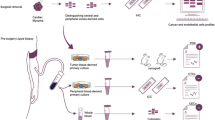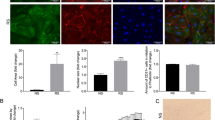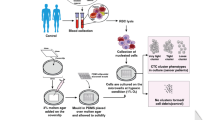Abstract
Blood circulating endothelial cells (CECs) and circulating hematopoietic progenitor cells (CPCs) represent two cell populations that are thought to play important roles in tissue vascularization. CECs and CPCs are currently studied as surrogate markers in patients for more than a dozen pathologies, including heart disease and cancer. However, data interpretation has often been difficult because of multiple definitions, methods and protocols used to evaluate and count these cells by different laboratories. Here, we propose a cytometry protocol for phenotypic identification and enumeration of CECs and CPCs in human blood using four surface markers: CD31, CD34, CD133 and CD45. This method allows further phenotypic analyses to explore the biology of these cells. In addition, it offers a platform for longitudinal studies of these cells in patients with different pathologies. The protocol is relatively simple, inexpensive and can be adapted for multiple flow cytometer types or software. The procedure should take 2–2.5 h, and is expected to detect 0.1–6.0% viable CECs and 0.01–0.20% CPCs within blood mononuclear cell population.
This is a preview of subscription content, access via your institution
Access options
Subscribe to this journal
Receive 12 print issues and online access
$259.00 per year
only $21.58 per issue
Buy this article
- Purchase on Springer Link
- Instant access to full article PDF
Prices may be subject to local taxes which are calculated during checkout


Similar content being viewed by others
References
Rafii, S., Lyden, D., Benezra, R., Hattori, K. & Heissig, B. Vascular and haematopoietic stem cells: novel targets for anti-angiogenesis therapy? Nat. Rev. Cancer 2, 826–835 (2002).
Aicher, A. et al. Essential role of endothelial nitric oxide synthase for mobilization of stem and progenitor cells. Nat. Med. 9, 1370–1376 (2003).
Bertolini, F., Shaked, Y., Mancuso, P. & Kerbel, R.S. The multifaceted circulating endothelial cell in cancer: towards marker and target identification. Nat. Rev. Cancer 6, 835–845 (2006).
Jain, R.K., Duda, D.G., Clark, J.W. & Loeffler, J.S. Lessons from phase III clinical trials on anti-VEGF therapy for cancer. Nat. Clin. Pract. Oncol. 3, 24–40 (2006).
Monestiroli, S. et al. Kinetics and viability of circulating endothelial cells as surrogate angiogenesis marker in an animal model of human lymphoma. Cancer Res. 61, 4341–4344 (2001).
Mancuso, P. et al. Resting and activated endothelial cells are increased in the peripheral blood of cancer patients. Blood 97, 3658–3661 (2001).
Duda, D.G. et al. Differential CD146 expression on circulating versus tissue endothelial cells in rectal cancer patients: implications for circulating endothelial and progenitor cells as biomarkers for antiangiogenic therapy. J. Clin. Oncol. 24, 1449–1453 (2006).
Duda, D.G. et al. Reply to: Detection of circulating endothelial cells: CD146-based magnetic separation enrichment or flow cytometric assay? J. Clin. Oncol. 25, e3–e5 (2007).
Willett, C.G. et al. Direct evidence that the VEGF-specific antibody bevacizumab has antivascular effects in human rectal cancer. Nat. Med. 10, 145–147 (2004).
Willett, C.G. et al. Surrogate markers for antiangiogenic therapy and dose-limiting toxicities for bevacizumab with radiation and chemotherapy: continued experience of a phase I trial in rectal cancer patients. J. Clin. Oncol. 23, 8136–8139 (2005).
Batchelor, T.T. et al. AZD2171, a pan-VEGF and PDGF receptor tyrosine kinase inhibitor, normalizes tumor vasculature and alleviates vasogenic edema in glioblastoma patients. Cancer Cell 11, 83–95 (2007).
Rugo, H.S. et al. Change in circulating endothelial cells (CEC) predicts progression free survival (PFS) in patients (pts) with hormone receptor positive metastatic breast cancer (MBC) receiving letrozole and bevacizumab (ASCO 42). J. Clin. Oncol. 24, 3039 (2006).
Acknowledgements
We thank Drs. C. Willett, T. Batchelor, G. Sorensen and M. Ancukiewicz for collaborations on correlative clinical studies, and S. Roberge and G. Gorospe for technical assistance. This work was supported by US National Cancer Institute grants P01-CA80124 and R01-CA115767 to R.K.J. and an American Association for Cancer Research Award to D.G.D.
Author information
Authors and Affiliations
Corresponding author
Ethics declarations
Competing interests
The authors declare no competing financial interests.
Rights and permissions
About this article
Cite this article
Duda, D., Cohen, K., Scadden, D. et al. A protocol for phenotypic detection and enumeration of circulating endothelial cells and circulating progenitor cells in human blood. Nat Protoc 2, 805–810 (2007). https://doi.org/10.1038/nprot.2007.111
Published:
Issue Date:
DOI: https://doi.org/10.1038/nprot.2007.111
This article is cited by
-
PD-L1-positive circulating endothelial progenitor cells associated with immune response to PD-1 blockade in patients with head and neck squamous cell carcinoma
Cancer Immunology, Immunotherapy (2024)
-
Spatially defined single-cell transcriptional profiling characterizes diverse chondrocyte subtypes and nucleus pulposus progenitors in human intervertebral discs
Bone Research (2021)
-
Changes in Circulating Stem and Progenitor Cell Numbers Following Acute Exercise in Healthy Human Subjects: a Systematic Review and Meta-analysis
Stem Cell Reviews and Reports (2021)
-
Endothelial Progenitor Cells Induce Angiogenesis: a Potential Mechanism Underlying Neovascularization in Encephaloduroarteriosynangiosis
Translational Stroke Research (2021)
-
The relationship between endothelial progenitor cells and pulmonary arterial hypertension in children with congenital heart disease
BMC Pediatrics (2019)
Comments
By submitting a comment you agree to abide by our Terms and Community Guidelines. If you find something abusive or that does not comply with our terms or guidelines please flag it as inappropriate.



